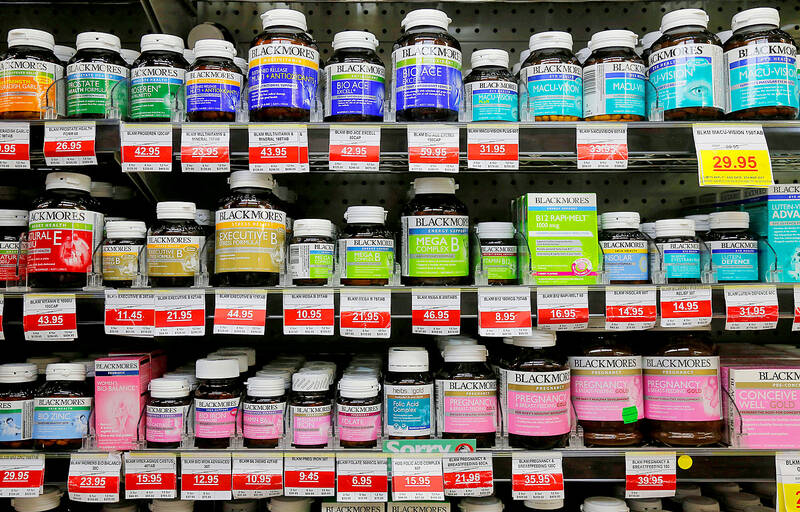Supplements are no cottage industry. Hawked by the likes of the Kardashian-Jenner clan, vitamin gummies have in recent years found popularity among millennials and zoomers, who are more receptive to supplements in the form of “powders, liquids and gummies” than older generations. Gwyneth Paltrow’s Goop — no stranger to dubious health trends — sells its own line of such supplements.
On TikTok, influencers who shill multivitamin gummies — and more recently, vitamin patches resembling cutesy, colorful stickers or fine line tattoos — promise glowing skin, lush locks, energy boosts and better sleep. But if it’s real health benefits you’re after, you’re better off saving your pennies.
What does the evidence say about multivitamins?

Photo: AP
The average person can get their recommended intake of vitamins (which have a plant or animal origin, such as vitamin C and vitamin B12) and minerals (elements such as iron, zinc and iodine) from food alone.
“A person who is healthy and has access to a balanced diet, particularly whole foods, generally does not need vitamin supplements,” says Barbara Mintzes, professor of evidence-based pharmaceutical policy at the University of Sydney.
“In almost all cases, people are paying a lot of money for things that are not providing them any benefit at all,” agrees Prof Nial Wheate, director of academic excellence and a medicines researcher at Macquarie University.

Photo: Reuters
Multivitamins contain a variety of vitamins and minerals — experts often quip that they make for very expensive urine.
‘WEE THEM OUT’
“A lot of vitamins are water soluble. So once you’ve saturated your body stores, you just wee them out,” says Clare Collins, a professor of nutrition and dietetics at the University of Newcastle.
While specific supplements are important for conditions linked to nutrient deficiencies (more on this later), for the general population there is scant evidence multivitamins have any health benefits.
Numerous meta-analyses — which analyze results from multiple studies — have found multivitamins do not improve heart health, reduce the risk of certain cancers or make people live longer. An Australian meta-analysis of trials in older adults found multivitamins made no difference to mortality risk.
Collins suspects multivitamins are so popular because they are taken as an insurance policy of sorts because people know they probably don’t eat as healthily as they should.
“Unfortunately, you’re not necessarily getting everything you need [from multivitamins] like dietary fibers and other items … such as phytonutrients, plant-based chemicals that occur naturally in a range of foods.”
In some cases, supplements can do more harm than good. Some fat-soluble vitamins, such as vitamin A, are stored in the liver and can accumulate to dangerous levels if overconsumed, though Collins says this is unlikely to occur from multivitamins.
“Harm tends to come when [people] isolate out just one and take megadoses of that.”
For supplements that purport to have specific benefits — such as hair, skin and nail formulations — Helen Macpherson, a senior research fellow at Deakin University’s Institute for Physical Activity and Nutrition, advises wariness about health claims being made.
“Often the ingredients are [in concentrations] just too low to have any physiological benefit,” she says.
Vitamins marketed specifically for hair, skin and nail health often contain biotin, a B vitamin that one review found had “no proven efficacy in hair and nail growth of healthy individuals.” A US study of 176 products marketed as hair, skin and nail supplements found they contained 255 distinct ingredients, including biotin at doses ranging between 100 percent and 33,333 percent of the recommended daily intake. US regulators have repeatedly issued warnings that biotin can interfere with lab tests, giving false results for troponin, a biomarker used to diagnose heart attacks.
In Australia, most multivitamins are regulated by the Therapeutic Goods Administration as “listed” medicines, which have less stringent rules than those classified as “registered” medicines, such as prescription drugs.
“When someone starts a vitamin company, the only thing they have to prove to the government is that it’s safe. They do not have to prove that it works,” Wheate says.
According to Wheate, vitamin patches contain very low concentrations of ingredients, and there’s no guarantee they even work because not all drugs can be delivered through the skin.
And what of gummies sold by Kourtney Kardashian, which supposedly support “vaginal health, freshness and odor?” They “do not add any health benefits for women,” one expert found in a thorough but civil rubbishing.
WHO SHOULD TAKE THEM
In certain cases, there are clear benefits to taking supplements. Vegans, for example, are at higher risk of vitamin B12 deficiency, because it is the only vitamin that humans get exclusively from animal sources — though Collins says it is often added to plant-based milk products.
Iron supplements may be required to prevent or treat iron-deficiency anemia. Likewise, people at higher risk of osteoporosis, such as postmenopausal women, may be advised to take calcium and vitamin D to supplement dietary intake.
Folate, iodine and vitamin D supplements are recommended for pregnant women because they are required for a fetus to develop normally. Vitamin D supplements may also be required for people with darker skin or who don’t get much sun.
And for people with age-related macular degeneration, a combination of zinc and antioxidants known as AREDS2 supplements can reduce the risk of the condition worsening.
“Absolutely there is a place for taking vitamin supplements,” says Macpherson. “Individuals really need to work with their healthcare provider to address those [nutrient deficiencies]. Taking a multivitamin in those cases isn’t going to be sufficient anyway.”

On April 26, The Lancet published a letter from two doctors at Taichung-based China Medical University Hospital (CMUH) warning that “Taiwan’s Health Care System is on the Brink of Collapse.” The authors said that “Years of policy inaction and mismanagement of resources have led to the National Health Insurance system operating under unsustainable conditions.” The pushback was immediate. Errors in the paper were quickly identified and publicized, to discredit the authors (the hospital apologized). CNA reported that CMUH said the letter described Taiwan in 2021 as having 62 nurses per 10,000 people, when the correct number was 78 nurses per 10,000

As we live longer, our risk of cognitive impairment is increasing. How can we delay the onset of symptoms? Do we have to give up every indulgence or can small changes make a difference? We asked neurologists for tips on how to keep our brains healthy for life. TAKE CARE OF YOUR HEALTH “All of the sensible things that apply to bodily health apply to brain health,” says Suzanne O’Sullivan, a consultant in neurology at the National Hospital for Neurology and Neurosurgery in London, and the author of The Age of Diagnosis. “When you’re 20, you can get away with absolute

May 5 to May 11 What started out as friction between Taiwanese students at Taichung First High School and a Japanese head cook escalated dramatically over the first two weeks of May 1927. It began on April 30 when the cook’s wife knew that lotus starch used in that night’s dinner had rat feces in it, but failed to inform staff until the meal was already prepared. The students believed that her silence was intentional, and filed a complaint. The school’s Japanese administrators sided with the cook’s family, dismissing the students as troublemakers and clamping down on their freedoms — with

As Donald Trump’s executive order in March led to the shuttering of Voice of America (VOA) — the global broadcaster whose roots date back to the fight against Nazi propaganda — he quickly attracted support from figures not used to aligning themselves with any US administration. Trump had ordered the US Agency for Global Media, the federal agency that funds VOA and other groups promoting independent journalism overseas, to be “eliminated to the maximum extent consistent with applicable law.” The decision suddenly halted programming in 49 languages to more than 425 million people. In Moscow, Margarita Simonyan, the hardline editor-in-chief of the